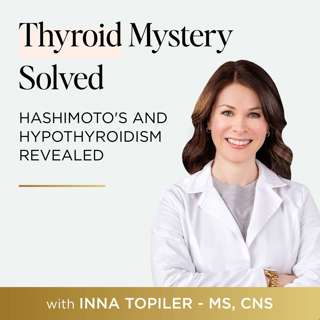
181 The Truth About Coffee and Autoimmune Health with Dr. Vincent Pedre
In this episode, Inna Topiler is joined by gut health expert Dr. Vincent Pedre to explore the hidden connections between coffee, fatigue, and Hashimoto’s.They dive into Samantha’s story—a busy mom of three who relied on coffee to power through her day but found herself trapped in an exhausting cycle of energy crashes. Inna and Dr. Pedre uncover surprising truths about coffee, including hidden toxins like mold, pesticides, and heavy metals, and how these can impact thyroid function, gut health, and overall energy and exactly what you can do to help this.They also discuss how caffeine affects slow metabolizers, the link between coffee and adrenal stress, and practical steps for enjoying coffee in a way that supports your health. Yes you can still enjoy your coffee if done the right way.Tune in now to learn how Samantha regained her energy—without giving up coffee completely!You can find the full show notes here:https://innatopiler.com/podcasts/coffee-autoimmune-health-dr-vincent-pedre/For everything Hashimoto’s please visit www.InnaTopiler.comIf you struggle with losing weight with Hashimoto’s - This is for you www.InnaTopiler.com/jumpstartBe sure you are following Inna on Instagram - www.instagram.com/innatopiler for all the latest Hashimoto’s help and support.
26 Dec 202448min

180 When Food Isn’t Medicine: Thyroid and Hormone Truths with Emily Sadri
In this episode, Inna sits down with Emily Sadri to explore a case from her Thyroid Mystery Solved program. Meet Janet. Janet is a devoted advocate for natural living, who found herself facing symptoms that didn’t align with her healthy lifestyle. Despite eating clean, using toxin-free products, practicing yoga, and prioritizing her mental health, Janet began experiencing fatigue, weight gain, brain fog, and significant hair loss.After being diagnosed with Hashimoto’s and hypothyroidism, Janet struggled with the idea of taking thyroid medication, feeling it clashed with her natural approach. Through Inna’s Thyroid Mystery Solved program and personalized consultation, Janet discovered the nuances of thyroid health, including the importance of understanding thyroid subtypes and the role of both thyroid and sex hormones in achieving balance.Inna and Emily dive into:-Why and when some cases of hypothyroidism do need medication—and why it’s not a failure if you do.-The importance of not just your thyroid type but also subtype to understand what your body needs.-The role of estrogen and progesterone in energy, mood, and hair health—and when and why hormonal support (not just natural remedies) may be necessary in some cases.-The connection between Hashimoto’s, emotional health, and common triggers like EBV.-And how Janet regained her energy, stopped her hair loss, and lost 10 pounds—all within three months.Tune in to see how Janet’s journey unfolded and the transformative steps that helped her regain her energy, clear her brain fog, stop hair loss, and lose 10 pounds.You can see the full show notes here (please write in link, not hyperlink)More information about Inna’s Thyroid Mystery Solved Program - www.thyroidmysterysolved.comIf you are trying to lose weight, be sure you also check out Inna’s 10 days Hashimoto’s Weight Loss Transformation www.InnaTopiler.com/Jumpstart
12 Dec 202436min

179 How Meditation Transforms Sleep and Reduces Stress for Hashimoto’s with Emily Fletcher
In this episode, Inna dives into the complex relationship between stress, insomnia, and Hashimoto’s, sharing why so many struggle with sleepless nights and Hashimoto’s flares and what can be done to change it. She highlights Amanda’s story—a Hashimoto’s patient who tried everything to sleep better but couldn’t quiet her busy mind.To tackle this common challenge, Inna is joined by Emily Fletcher, renowned meditation expert and founder of Ziva Meditation. Together, they explore how stress impacts sleep and therefore Hashimoto’s, why traditional remedies often fall short, and how meditation can be a transformative tool for people with Hashimoto’s.You will get actionable strategies for improving sleep, including natural supplements, lifestyle adjustments, and ways to incorporate meditation even into the busiest routines. This episode sheds light on how calming the mind and supporting the body holistically can lead to not just restorative sleep but better Hashioto’s management.Tune in to learn how Amanda reclaimed her rest and body—and how you can too.Jump to the full episode show notes here:https://innatopiler.com/podcasts/meditation-sleep-stress-hashimotos-emily-fletcher/
28 Nov 202429min

178 The Truth About Losing Weight with Hashimoto’s and Hypothyroidism
In this episode, Inna discusses why it is often very difficult to lose weight with Hashimoto’s.Restricting calories and working out more will only take you so far and in order to really see results, it's about looking at the whole picture.Inna discusses 3 real cases of weight loss success and you will see how each person successfully lost weight by addressing the factors that were holding them back.If you are struggling with losing weight with Hashimoto’s, you don’t have to do it alone!Inna is so excited to introduce her brand new 10 Day Hashimoto’s Weight Loss Transformation. A 10 day program that is doable for anyone and something that is very affordable. It will be out next week and the first 100 people will get an even bigger discount and extra bonuses.Please join the waitlist at www.innatopiler.com/jumpstart to be the first to know when it is out.You can also find the full episode show notes at https://innatopiler.com/podcasts/losing-weight-hashimotos-hypothyroidism/
14 Nov 202420min

177 Health Transformation with Thyroid, Pain, Fatigue, and Beyond with Beth Mosher
In today’s episode Inna is joined by her associate and fellow mystery solver Beth Mosher where they dive into 4 real cases that show that stubborn weight, fatigue, chronic pain, digestive mysteries really can be solved when you look at it from the right angle and take the right approach.These cases are people that may be just like you. Tune in to see their symptoms and exactly what they did to resolve them through a combination of diet, nutrients and other very specific natural approaches.If you are dealing with symptoms and can’t seem to get to the bottom of it on your own, please connect with our office here and we would be happy to help!You can also view the full show notes HERE
31 Okt 202448min

176 Is Self-Sabotage Causing Your Weight Gain and Fatigue? How to Get Over It with Elyssa Smith
What Causes Weight Gain and Fatigue Even When You Have a Healthy Lifestyle?Jump to the FULL SHOW NOTES HERE for all the linksThe Case: Dana is post-menopausal and experiencing weight gain, fatigue, and a general sense of not feeling well.She feels like she’s doing everything right: eating well, working out, and taking supplements, yet nothing is working.Along with her physical symptoms, Dana struggles with stress, anxiety, and feelings of overwhelming.Addressing More Than Just the ThyroidTo dig deeper into Dana’s health mystery, I invited Elyssa Smith, a trauma-informed life strategist and highly regarded speaker, onto the podcast. Elyssa specializes in helping people overcome trauma and self-sabotage so they can live their best lives. Her perspective was invaluable in addressing the mind-body connection, particularly how trauma can impact our health.Elyssa shared insights into how trauma—both big and small—can contribute to chronic health issues like those Dana was facing. While Dana's biochemical factors such as her thyroid levels, diet, and exercise regimen were important, Elyssa explained that trauma could still keep her body stuck in a state of fight-or-flight, preventing healing.Press Play to find out if trauma might be at the root of your inability to lose weight.Find out more about Inna here: https://innatopiler.com/podcast/
17 Okt 202449min

175 Perimenopause and Hashimoto’s + My Personal Hormone Journey
Unexplained Weight Gain? What You Need to Know About Perimenopause and MenopauseJump to the FULL SHOW NOTES HERE for all the linksOne of the most common things I hear from women, especially those in their late 30s and 40s, is that they suddenly experience weight gain, brain fog, and fatigue. These symptoms often seem to appear out of nowhere, and no matter what they try – changing their diet, increasing exercise – nothing seems to work.Many women are surprised to learn that these changes could be linked to perimenopause, which can start as early as age 35 and last from 10-15 years. Hormones like estrogen, progesterone, and testosterone begin to decline at different rates depending on the individual, which can cause a variety of symptoms long before we experience symptoms we associate with menopause like hot-flashes.Today, I'm sharing My Personal Hormone Journey. https://innatopiler.com/podcast/
3 Okt 202434min

174 A Tick Bite, Lyme Disease, and the Hashimoto's Connection with Dr. Darin Ingles
How a Tick Bite Sparked My Daughter’s Lyme Scare and What It Means for Hashimoto’s. Expert Dr. Darin Ingles Weighs In.Jump to the FULL SHOW NOTES HERE for all the linksThe Case:Juliette is my healthy, happy 3 year old daughter.One morning, I discovered that what I thought was a little pimple at the nape of her neck was actually a tick.Juliette had no idea it was there which is how so many people are shocked to develop Lyme disease because they never knew they were bitten.Lyme Disease and Hashimoto's: How They IntersectI invited Dr. Darin Ingles back to the podcast to dig deeper into the issue of Lyme disease and its connection with Hashimoto’s. Dr. Ingles, a naturopathic doctor and expert in Lyme disease, is the author of The Lyme Solution and has helped countless patients with Lyme and related conditions, including Hashimoto’s.Lyme disease is the fastest-growing infectious disease in the world, with thousands of cases often going undiagnosed or misdiagnosed, especially when symptoms overlap with autoimmune conditions like Hashimoto’s. In our conversation, Dr. Ingles shared insights on why Lyme disease can trigger thyroid issues and other chronic conditions, like Hashimoto's, and why it's essential to address these root causes early.For more visit: https://innatopiler.com/podcast/
19 Sep 202446min




















